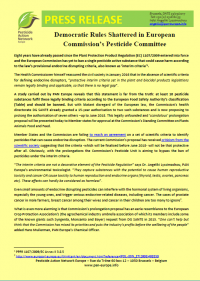Eight years have already passed since the Plant Protection Product Regulation (EC) 1107/2009 entered into force and the European Commission has yet to ban a single pesticide active substance that could cause harm according to the law’s provisional endocrine disrupting criteria, also known as ‘interim criteria’[1].
The Health Commissioner himself reassured the civil society in January 2016 that in the absence of scientific criteria for defining endocrine disruptors, “protective interim criteria set in the plant and biocidal products legislations remain legally binding and applicable, so that there is no legal gap” (attachment 1).
A study carried out by PAN Europe reveals that this statement is far from the truth: at least 10 pesticide substances fulfil these legally binding criteria according to the European Food Safety Authority’s classification (Table) and should be banned. But with blatant disregard of the European law, the Commission’s health directorate DG SANTE already granted a 15-year authorisation to two such substances and is now proposing to prolong the authorisation of seven others –up to June 2018. This legally unfounded and ‘scandalous’ prolongation proposal will be presented today, March 23rd, to Member states for approval at the Commission’s Standing Committee on Plants Animals Food and Feed.
Member States and the Commission are failing to reach an agreement on a set of scientific criteria to identify pesticides that can cause endocrine disruption. The current Commission’s proposal has received criticism from the scientific society suggesting that the criteria -which will be finalised before June 2018- will not be that protective after all. Obviously, with the prolongations the Commission’s Pesticide Unit is aiming to bypass the ban of pesticides under the interim criteria.
“The interim criteria are not a decorative element of the Pesticide Regulation” says Dr. Angeliki Lyssimachou, PAN Europe’s environmental toxicologist. “They capture substances with the potential to cause human reproductive toxicity and cancer OR cause toxicity to human reproduction and endocrine organs (thyroid, testis, ovaries, pancreas etc). These effects can hardly be considered as harmless”.
Even small amounts of endocrine disrupting pesticides can interfere with the hormonal system of humans and animals, especially the young ones, and trigger serious endocrine-related diseases, including cancer. The cases of prostate cancer in male farmers, breast cancer among their wives and cancer in their children are too many to ignore[2].
What is even more alarming is that Commission’s prolongation proposal has an eerie resemblance to the European Crop Protection Association's (the agrochemical industry umbrella association of which its members include some of the known giants such Syngenta, Monsanto and Bayer) request from DG SANTE in 2015. “One can’t help but think that the Commission has mixed its priorities and puts the industry's profits before the wellbeing of the people” added Hans Muilerman, PAN Europe’s Chemical Officer.
Contact: Angeliki Lyssimachou, +32 2 318 62 55
[1] PPPR 1107/2009/EC Annex II 3.8.5
[2] http://www.europarl.europa.eu/thinktank/en/document.html?reference=IPOL-JOIN_ET(2008)408559
